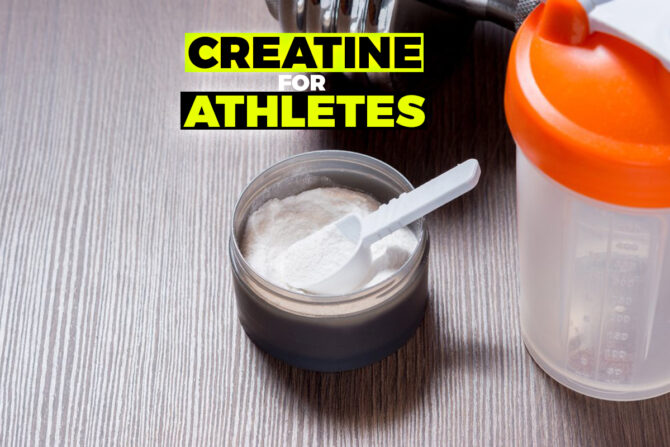
Best Creatine For Endurance Athletes
The human system naturally contains creatine, which is mostly stored in the muscles for energy production. As dietary supplements have grown in popularity, creatine has also gained popularity as a substance for athletes looking to improve performance. This is due to the fact that taking creatine supplements has been shown to enhance strength, increase lean muscle mass, and promote faster muscle recovery after exercise. This can result in quicker sprint speeds and decreased muscular exhaustion for athletes, especially during high-intensity, quick workouts. Pushing forward and improving your performance is a never-ending goal for endurance athletes. Creatine monohydrate is one of the products that has drawn a lot of interest in this search.
What is Creatine?

Creatine is an amino acid naturally occurring compound found in various foods, such as meat and fish. Some organs, like the liver, pancreas, and kidneys, also produce it. The body produces 1-2 g of creatine per day naturally, and 1-2 g is ingested through diet, for a daily total of 2-4 g. Our muscles require creatine to produce energy, especially while doing high-intensity, brief workouts like weightlifting and running. Our skeletal muscles take up around 95% of the creatine you need to perform physical activity. Your heart, brain, and other tissues get the remaining portion. Meanwhile, the body gradually degrades and eliminates creatine. This indicates that more creatine is required in the diet in order to increase the concentration of creatine in the muscle.
Why Should You Supplement Creatine?

Our body naturally creates some creatine; taking supplements can help you considerably increase your levels. This supplement can boost your capacity to carry out high-intensity workouts and improve muscular performance. Athletes or anyone else looking to enhance their physical performance can benefit from it. Athletes can boost their energy production and endurance performance by supplementing with creatine to raise the levels of this protein in their muscles. It has been found that using creatine supplements speeds up the healing process following hard training sessions, enabling athletes to gradually increase training volume and intensity.
What Creatine Can Do for Endurance Athletes: The Benefits
1. Enhanced Strength and Muscle Endurance
It has been demonstrated that creatine monohydrate increases muscle strength and power, especially in endurance athletes. In well-trained triathletes, creatine supplementation dramatically enhances cycling power output, as shown by a 2019 study. This improved performance continued throughout the cycling portions of a triathlon.

2. Increased Ability to Perform Intensive Exercise
Creatine’s relevance to intensive exercises has garnered attention in recent years. By helping to replace adenosine triphosphate (ATP), the main energy currency of cells, creatine supplementation may be beneficial to endurance athletes. This could improve their capacity to engage in intense exercise. During these crucial periods of anaerobic energy demand during an endurance event, creatine supplementation may help postpone tiredness and enhance overall performance by boosting the availability of ATP. Furthermore, it has been shown that using creatine supplements increases the storage of muscle glycogen, which is advantageous for endurance athletes because glycogen is an essential energy source for extended exercise.
3. Accelerated Recovery
The role that creatine plays in helping endurance athletes recover more quickly is complex and important. Long-distance running and cycling are examples of endurance exercises that can cause significant oxidative stress and muscle damage, which can cause weariness and a delayed rate of recovery. It has been demonstrated that supplementing with creatine improves the body’s capacity to rebuild and repair muscle after intense exercise, which speeds up recovery periods for endurance athletes. Increasing the availability of phosphocreatine (PCr) in muscle cells is one important way that creatine aids in this process. In order to buffer ATP levels during high-intensity exercise and facilitate ATP resynthesis during recovery periods, PCr is essential. Athletes can recuperate more quickly in between training sessions or competitions by taking creatine supplements, which can help refill PCr stores more quickly and restore cellular energy levels more efficiently after exercise.
4. Benefits for Brain Health
Although the primary advantages of creatine supplementation are frequently associated with improved physical performance, new research indicates that it may also have advantageous impacts on mental health, which is particularly important for endurance athletes. In order for cells to properly metabolise energy, particularly those in the brain, where it is essential for cognitive function, creatine must be present. Due to the physical strain on their bodies, endurance athletes who participate in lengthy and rigorous training sessions may suffer from mental exhaustion, poor attention, and diminished cognitive function. By improving cognitive function, promoting brain energy metabolism, and lowering mental fatigue during prolonged endurance activities, creatine supplementation may be able to alleviate these effects.
5. Reduce Blood Sugar and Combat Diabetes
It has been shown that creatine increases insulin sensitivity, which lowers blood sugar levels. This can help endurance athletes since it makes it easier for the body to control glucose levels during extended exercise. Creatine may help avoid blood sugar increases after hard training sessions or contests by improving insulin sensitivity. Supplementing with creatine has also been associated with enhanced muscle absorption of glucose, which gives muscles a ready-to-use energy source for endurance exercises. In athletes who regularly train for endurance, these changes may potentially have an impact on treating diabetes and improving performance.
Which Kind of Creatine Is Best for You?
Creatine Monohydrate
Because creatine monohydrate has the ability to enhance physical performance, endurance athletes frequently include it in their supplement routine. This naturally occurring substance is frequently present in meals like fish and meat. Creatine monohydrate has the ability to boost muscle strength and power, replenish energy stores, and accelerate muscle recovery. It helps athletes push harder during high-intensity exercises and recover more rapidly from longer endurance sports. This supplement is particularly beneficial for endurance athletes who want to improve their training programme, delay fatigue, and perform better.
What is the Appropriate Creatine Dosage for Endurance Athletes?
The recommended daily intake of creatine for endurance athletes usually falls between 3 and 5 grams. Studies indicate that in order to rapidly fill the muscles with creatine, a loading phase of 20 grammes per day for 5–7 days may be helpful. After that, a maintenance dose of 3–5 grammes per day may be administered. This loading phase facilitates the efficient optimisation of muscle creatine reserves. Some athletes, however, can choose to begin with the maintenance dose right away and skip the loading phase. It’s crucial to remember that everyone reacts differently to creatine supplements, so it’s a good idea to speak with a medical expert or sports nutritionist for specific dosage recommendations.
Bottom Line
One of the least expensive, most efficient, and reliable supplements available is creatine.
It promotes exercise performance, muscle growth, mental health, and older individuals’ quality of life. Older folks and vegans, who might not get enough creatine from their diet, might benefit most from supplements. whether you want to try creatine and see whether it works for you, the best form is probably creatine monohydrate.